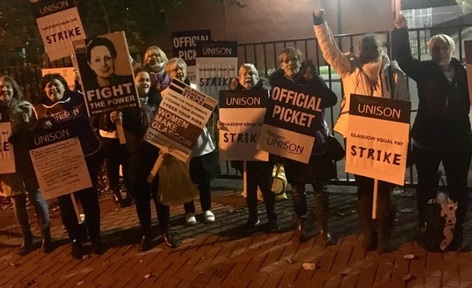Home care services hit by women's equal pay strike in Glasgow
Home care workers are among the low-paid council employees taking part in a 48-hour strike for equal pay in Glasgow.

Major UK strike over women's pay
A mass walkout of home care workers on 23-24 October, saw hundreds of care services across Glasgow affected, as 8,000 low-paid council workers protested against unequal pay in female-dominated council services.
Thought to be the UK's largest strike over women's pay, strike action affected schools, closed nurseries, hindered home care, cleaning and catering services, when care workers, childcare workers, caterers and cleaners walked out.
Women working in Glasgow City Council’s female-dominated services including home care receive less money than those in male-dominated services such as bin collection and took to the streets to protest because of the local authority's failure to settle their unequal pay claims.
Twelve-year fight for equal pay
Dave Prentis, general secretary of trade union UNISON has said low paid workers, mostly women have had enough.
"For twelve years they’ve fought for equal pay, and yet throughout Glasgow City Council have dragged their heels and failed to pay these incredible public service workers the wage they deserve. "Together in UNISON, we have taken the fight to the courts and to the streets.”
The 48-hour strike began at 7am on 23 October with strikers gathering at Glasgow Green from 11.30am and marching to City Chambers in George Square.
That morning, Glasgow Council leader Susan Aitken took to the airwaves with a message that there was no need for the strike because the council was 'so close' to reaching a settlement.
However, campaign group Action 4 Equality Scotland has said Glasgow City Council faces 13,000 outstanding equal pay claims made by female workers employed in home care and other female-dominated council services, which are now heading to the Employment Tribunal.
The campaign group estimates backdated unequal pay claims and pay increases could cost the council between £500m to £1bn.
Action 4 Equality Scotland stated: ‘The reality is that Glasgow has been 'talking the talk' over equal pay for several months, but a settlement to this long-running dispute will only be found if and when the City Council starts 'walking the walk'.
Glasgow City Council stated on 12 October 'Letters are being sent to home care service users over the next three days to advise them how the strike will impact on their care and allow them time to make alternative arrangements and seek support from family, carers or others.
'There will be significant disruption to a range of services, including home care, and we will concentrate resources on priority services and the most vulnerable users. Where we anticipate services being withdrawn or significantly altered, we will contact users directly.
'The services that will be disrupted are, primarily, ones where we are able to identify users - for example, people receiving a homecare package.'
Latest News
 29-Jul-24
Dementia Bus gives carehome.co.uk staff insight into life with dementia
29-Jul-24
Dementia Bus gives carehome.co.uk staff insight into life with dementia
 27-Jul-23
UK's top home care agencies in 2023 revealed
27-Jul-23
UK's top home care agencies in 2023 revealed
 30-Nov-22
A quarter of older people keep their falls secret from family
30-Nov-22
A quarter of older people keep their falls secret from family
 29-Nov-22
'Covid-19 has not gone away' say terminally ill
29-Nov-22
'Covid-19 has not gone away' say terminally ill
 28-Nov-22
IT consultant who received poor care opens 'compassionate' home care business
28-Nov-22
IT consultant who received poor care opens 'compassionate' home care business